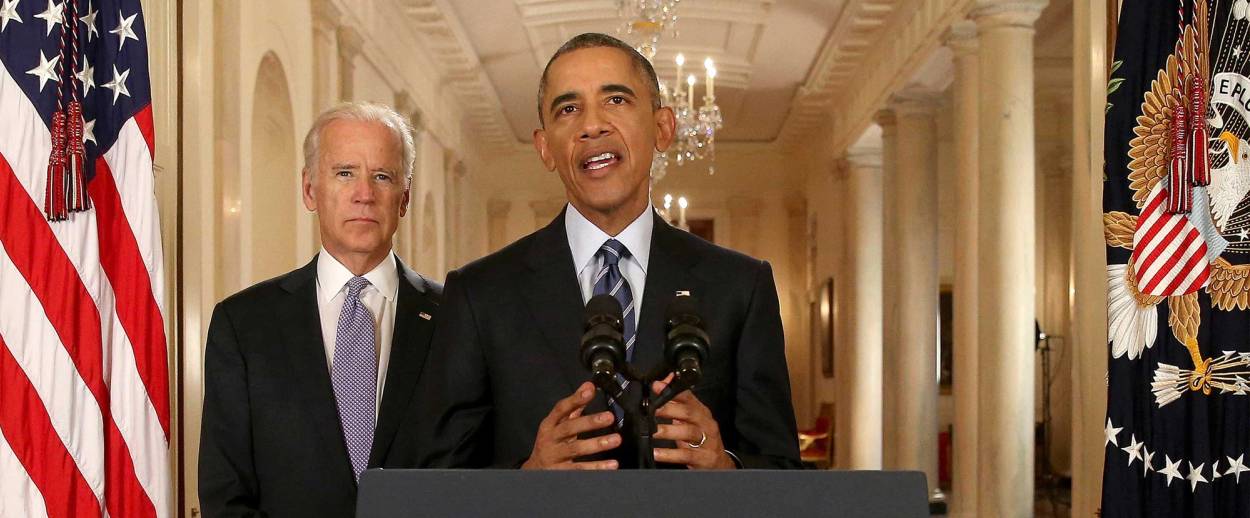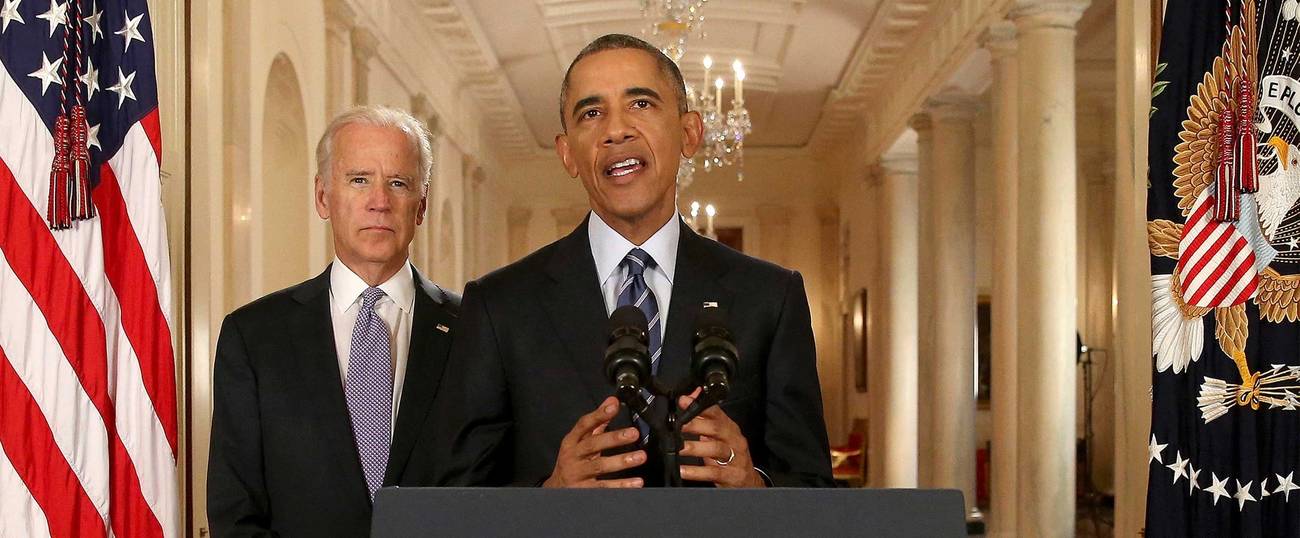The Iran Deal Is Now Officially a Disaster. So Where Were You?
Agents of Influence: The real consequence of Obama’s signature foreign policy initiative is mayhem




“Since the Obama administration and its negotiating partners struck the deal with Iran in July 2015,” Joshua Keating recently wrote in Slate, “the Middle East’s sectarian conflicts have only become deeper, more violent, and more intractable. From the half-million people killed in Syria to the rise of ISIS to the massive refugee crisis that has strained the world’s humanitarian capacity to its breaking point and contributed to the rise of right-wing populists in the West, it’s much harder now to say that Obama made the right decision in prioritizing the Iran deal above all else.”
No one who has been reading Tablet even casually over the past four years can be surprised to learn that Barack Obama’s signature foreign-policy initiative wasn’t just an arms agreement. It was an instrument used to rebalance U.S. interests, downgrading traditional allies like Israel, as well as Saudi Arabia, and upgrading Iran. The hope, Obama told an interviewer, was to create a geopolitical “equilibrium … in which there’s competition, perhaps suspicion, but not an active or proxy warfare.” Given the poverty of that hope, it should hardly come as a surprise that instead of the airy and ever-elusive notion of “geopolitical equilibrium” there is instead mayhem.

Yet Keating’s candid assessment is newsworthy because it comes from a writer who previously advocated for the JCPOA. As evidence he may have been wrong, Keating lists several examples of regional chaos—like the war in Yemen with civilians caught between Iranian proxies and Saudi forces. His change of heart, he explains, is also partly inspired by a confession made by White House aide Ben Rhodes in the recently released documentary about Obama’s foreign-policy team throughout 2016, The Final Year. Rhodes, writes Keating, acknowledges “that Obama’s reluctance to intervene to a greater extent in Syria was motivated in part by the desire to achieve the nuclear agreement with Bashar al-Assad’s patron, Iran.”
Keating now thinks that was a bad decision. “Looking at the devastating consequences of the Syrian war, not just for that country but for the region and the world, it’s hard not to argue that Obama should have made Syria his main and overwhelming foreign-policy focus, to the exclusion of nearly everything else, Iran deal be damned.”
Still, Keating’s article must have come as a surprise to colleagues who, while perhaps no less aware of the current reality in the Middle East, would scarcely dare to reassess their advocacy of the Iran deal in print, even with Ben Rhodes’ permission. One response to Keating’s article shows why. “A smart reflection,” tweeted Washington Post foreign-affairs writer Ishaan Tharoor, “shorn of the neocon demagoguery and hysteria of the usual suspects.”
That is, the argument that Keating makes is wrong when it comes from overly emotional people who are driven by suspect loyalties. But Keating is one of ours, not some “neocon” demagogue.
The name-calling sheds light on the true nature of the Iran-deal debate, which started with Obama’s second term and continues well into Trump’s first. As it turns out, for many participants, whether in the press, Washington think tanks, or even the pro-Israel community, the debate was never about the quality of argument or evidence, or the likely impact of the policies being debated. No, the Iran deal was a form of virtue-signaling that used the lives of tens of millions of people living in the Middle East as props—and whose favorite hate-word was “neocon,” a word that was enthusiastically applied to people of widely varying political leanings and stripes, especially if they were Jewish.
Jew-baiting aside, the true nature of Obama’s Middle East policies, which centered on the prospect and later the reality of the Iran deal from the beginning of his presidency, was visible to anyone who cared to observe and analyze. Starting even before the beginning of Obama’s second term, when a nuclear deal with Iran became the White House’s priority, I explained in Tablet here and here that the Obama administration was never serious about stopping Iran’s nuclear program and was never going to use military force to do so. There was nothing particularly brilliant or penetrating about my analysis, which mostly relied on Obama’s own statements and actions. What astonished me was that hundreds of other people were apparently determined to twist themselves into pretzels in order to deny reality.
It was clear starting in 2014 that the point of the deal, as I explained here and here, was to realign American interests with Iran’s. I wrote that ignoring the anti-Semitism that inspires the Iranian leadership and filling its coffers would unleash the clerical regime and facilitate its expansionary ambitions, reaching even the Golan Heights. Iran wouldn’t spend the money from sanctions relief on fixing the economy, I showed, but rather on weapons, terrorism, and war.
I explained that tilting against American allies would put them, and U.S. interests, at risk, and increase the likelihood of war from the Persian Gulf to the eastern Mediterranean.
Obviously, the administration laid off Assad for the sake of the Iran deal, for as I wrote a year into the Syrian conflict, toppling Assad would punish his ally Iran, which was the last thing the White House wanted. Instead, the Obama administration was sheltering Assad even as the sociopathic Syrian despot sent more bodies through his meat grinder, even as he threatened to gas civilians. I explained that U.N. ambassador Samantha Power’s famous 2002 volume The Problem from Hell describing how the United States ignores genocides served as the administration’s playbook for ignoring Assad’s genocide of Syria’s Sunni population.
For all the current concern about Russia’s intentions to undermine American interests, I showed in 2012 that the Obama administration had made a deal with Moscow over Syria that allowed the Russians to keep their client Assad in power. I explained that no matter how much the Obama administration deployed pretend diplomacy to get Vladimir Putin to do the right thing in Syria, it was actually ceding American interests while facilitating a genocide to placate Russia.
And now, the most vociferous deniers and name-callers admit that what was plainly true all along is also true for them. Ben Rhodes admits the Iran deal was the priority that tied our hands on Syria, and if we had done anything about Syria there would have been no deal. Slate, which, like almost all of the press, pushed for the JCPOA while haranguing opponents in Congress and the pro-Israel community, now publishes a long article admitting the Iran Deal was a mistake. Yes, Josh Keating deserves credit for his re-assessment. But let’s be honest—he’s simply acknowledging a reality that it is no longer possible even for echo-chamber hacks to ignore, like the fact that Spain is no longer a powerful empire. Look, see—there really are actual Iranian bases in Syria and real Iranian troops on the Golan Heights. Iran really did spend the $140 billion on weapons, not its own people—who riot in the streets against the regime.
What bugs me isn’t that the Obama administration and its media surrogates were wrong about one thing—like the JCPOA, or realignment, or the Syrian war. They were wrong about everything in the Middle East—just like George W. Bush was catastrophically wrong about Iraq. The difference is that back then, America still kept its word to its allies, Russia wasn’t in the Middle East, and Iran wasn’t flush with cash that we gave them to build a bomb. As it turns out, the smart kids were even dumber than the dumb kids. And four years of name-calling and groupthink didn’t alter reality one bit.
As it turned out, you didn’t have to be smart to get it right. You didn’t have to be a Middle East analyst. You didn’t need to have lived and traveled extensively in the region or know any Middle Eastern languages. Being honest, and making arguments based on evidence, sure would have helped, though.
Yes, the Obama administration made it uncomfortable for people like Josh Keating or Dennis Ross or Aaron David Miller or whoever else to say anything, even if they privately had their doubts. In 2012, I explained how the administration was targeting a politically active sector of the American public that was worried about the Iranian nuclear program—namely, Jews, especially Jewish Democrats. During the summer of 2015, when the White House was pulling out all the stops to get the deal done, I reported here in Tablet how administration officials like John Kerry and even the president himself were threatening a particular group who opposed the Iran deal, calling them names like dual loyalists, war-mongers, beholden to donors, lobbies, etc. You know—the usual suspects and their neocon demagoguery.
To be plain, they were talking about you. About the pro-Israel community, the American Jewish leadership. About ordinary American Jews. About anyone who thinks or argues differently than they do—meaning everyone who was right when they were wrong.
Wake up. America is a free country—Augie March walked here, the same way that Walt Whitman did. America needed the Jews at precisely the moment when they decided that it was more important to be “loyal” to a party and a president than to be faithful to their own genius and say the necessary thing.
Listen, it doesn’t matter how loud anyone yells or what names they call you. You can still register in any political party you want, and no one can kick you out, even the president of the United States. You can all stay Democrats—or become Communists, or even Republicans. But please, whatever you do, just stop playing the angles, and stop playing dumb. America has enough frightened conformists on both sides of the aisle who are afraid to say what they think or to think for themselves, without you.
America needs the Jews to think differently and help other people see the truth. As my boss here at Tablet once wrote, America needs its Jews to be Jewish. America needs Jews to speak uncomfortable truths, no matter who is in power, and no matter whose sacred cow gets gored. It will also keep us from being complicit in genocide—and try explaining that to your children.
***
You can help support Tablet’s unique brand of Jewish journalism. Click here to donate today.
Lee Smith is the author of The Permanent Coup: How Enemies Foreign and Domestic Targeted the American President (2020).